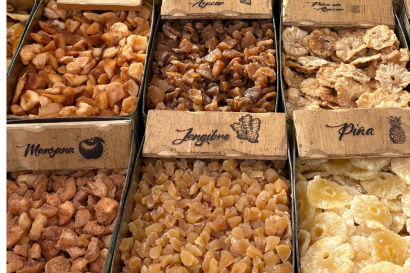Hi everyone! This post is for anyone nervous about adjusting to a new language abroad (particularly if you have heritage ties to the language), but all are welcome to read!
I’m sure as most people prepare to study abroad, they do simple things to add the language of their new country into their daily lives. A simple one that I did (and I found that many of my peers did, as well) is to switch my phone to Spanish. We all have phones that we use every day, so why not? Well, the problem is that we are so accustomed to technology that we barely have to read to know how to navigate our phones, regardless of the language in front of us. Doing this gave me a sense of hope that adjusting to a Spanish-speaking country would be seamless; however, I was very mistaken. But that’s okay! Here are some fun situations I’ve encountered and am learning to adjust to while abroad:
The accent. Before coming to Spain, you’ve probably have heard that Spaniards make a different sound, th, for particular words when compared to Latin American speakers. Most people describe the sound as “the Spanish lisp,” but it’s a little bit more than that. It has an interesting linguistic history, and that history explains why it exists in Spain and not in other Spanish-speaking countries. Regardless, I found this different sound to be very distracting at first. I’ve found it harder to understand certain speakers based on how strong of a th sound they make, but I’m getting more accustomed to it every day!
Similar to the th sound, there is another sound that Spaniards tend to make that Latin American speakers are less likely to make. It’s less known than the th sound, but I found it much more distracting. Without geeking out on the technical phonetics/phonology (thanks Professor Roosevelt!) of the sound, the sound they make can be thought of as throatier than the comparable sound that Latin America speakers would make. The sound really makes their Spanish sound foreign to me because I’m accustomed to Mexican Spanish the most, and in Mexican Spanish, the x sound that they produce is much softer. But, like the th sound, I'm getting more used to hearing it every day, and it’s becoming less distracting.
The dialect. Similar to the issues I’ve had with the accent, I’m getting more used to it every day. The dialect between Spanish-speaking countries all vary the same way they do for English countries, so when I find that I don’t understand what someone is trying to say even though I understand all of the individual words, I just ask! For example, during the first weekend here, the program took a one-day excursion to Segovia. Our tour guide, Ángel, was great in making sure we were always understanding what he was saying in Spanish. During one particular moment, however, he used the word cochino. In the context of his sentence, I didn’t understand why he would use that word. I grew up hearing that word mean “dirty boy/girl.” Ángel could tell that mostly everyone didn’t understand, so he told us that what he was saying actually meant “pig.” This is just one of many examples of changes in dialect that you’ll be sure to encounter in Spain whether you have heritage ties or not!
My name. As you can read, my name is Benancio Rodriguez. The name is obviously a very Spanish name, and on multiple occasions, people have assumed my Spanish to be at a higher level than it is. In the classroom, professors took note of my name on the first day of class and started asking where my family was from, and it’s caused me to be someone they call on when people are not answering. I don’t always have the words to answer the question they are asking, though. I have found that there isn’t much I can do about this (I suppose I could change my name), but I’ve found that I enjoy the increased opportunities to better my Spanish with natives initially assuming I’m more proficient than I really am!
Overall, there are plenty of things everyone will encounter that will cause there to be feel like you’re taking steps back in learning Spanish; however, at the end of the day, it’s all a learning process, and It’s important to just be patient!

Benancio Rodriguez
My favorite hobbies are running and wrestling. I started playing soccer when I was seven, but I gradually made my way to wrestling and running as I got older. I really enjoyed the team and the individual aspect of that these sports gave me that many other sports cannot.







